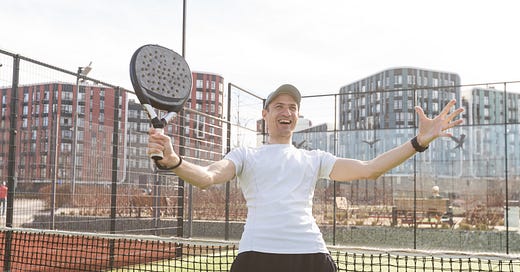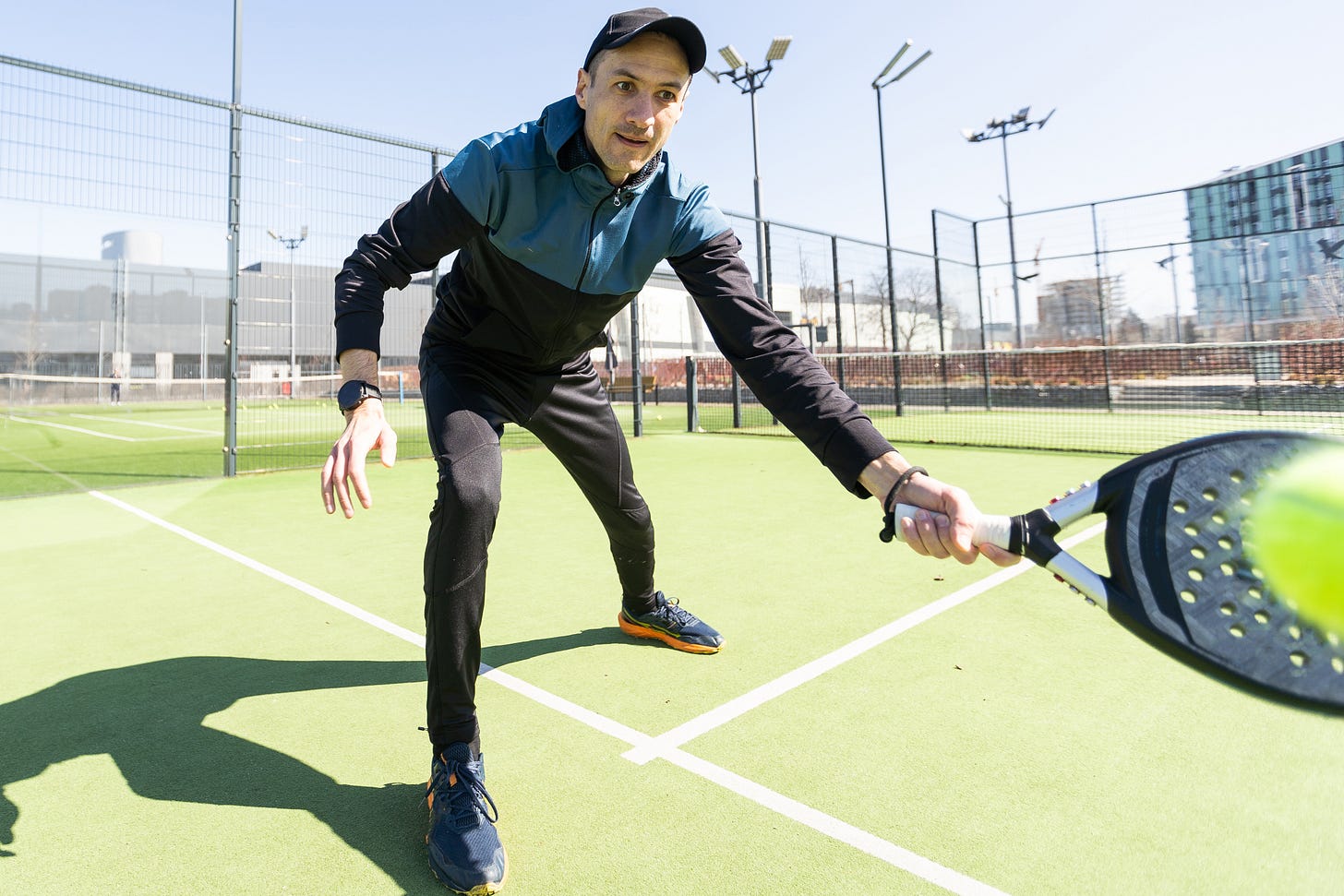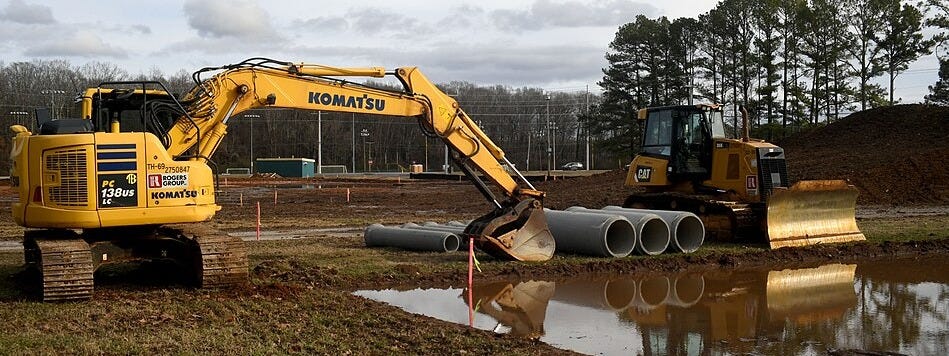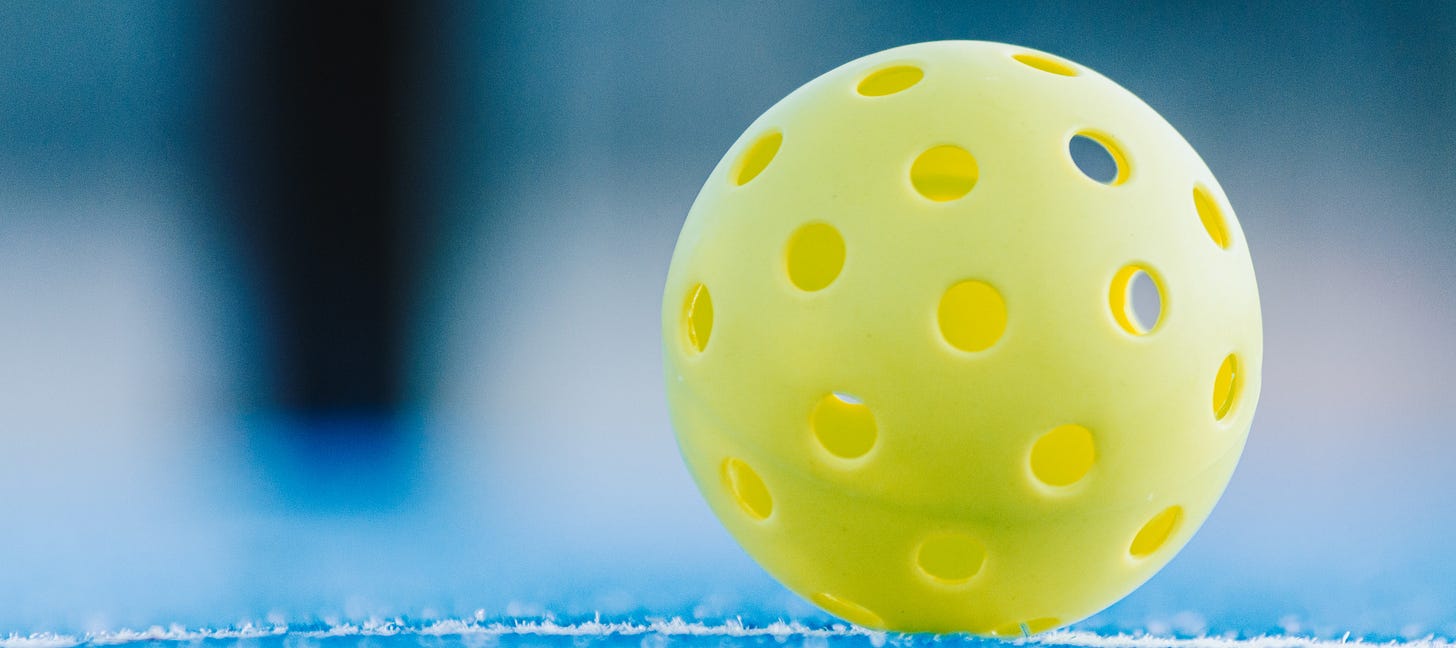It was inevitable I’d get to writing about Pickleball. I hadn’t because I hated it for the same reasons that everyone who hates it hates it. The hate of my tennis-playing friends may be more particular and defensive than the hate of non-tennis players without “skin in the game,” but we’re united in our contempt for the pretense that it’s an actual sport.
Of course, there’s more to it than that, and I don’t want to get drawn into a tedious argument about what is and what isn’t a sport. Is chess a sport? At the highest levels, yes, 100%. Is curling a sport? Respectfully, no. Is full-contact Trivial Pursuit, a game I invented 25 years ago but never got off the drawing board, a sport? Let’s see: it would begin life as a craze, and as it took broader hold and player levels were established, techniques formalized, and leagues formed, it would inevitably attract a rabid fan base insisting it’s a bona fide sport. And they’d have a case as it requires fast thinking, bursts of speed, escapability, and if you can’t summon the correct answer in time, the ability to absorb a hit. But no, full-contact Trivial Pursuit is not a sport, and I say that as its inventor! As its name suggests, it’s a pursuit or an activity you do with friends and family after dinner with pads and protection, but it’s not a sport.
So, because my hate for Pickleball - or the idea of it - is largely unoriginal, and because I don’t want to get any further into the “is it or isn’t a real sport” argument more than I just did, I’ve kept my distance. I should add that even if you made a convincing argument that Pickleball is a sport, it wouldn’t change my lack of respect for the game - or the idea of it, though this doesn’t extend to everyone who plays Pickleball. Many former professional tennis players play (Andre Agassi, Andy Roddick, Martina, Johnny Mac), former top pro Jack Sock joined the PPA Tour in 2023, and I’ve seen various levels of recreational play requiring impressive amounts of stamina, hand-eye, and foot-work. And given the millions of Americans who are overweight, out of shape, unmotivated, and haven’t even thought of cultivating a new athletic skill since grade school, the low barrier to entry makes Pickleball a healthier option than what they’re currently doing or would likely be doing, so far be it for me to criticize anything that gets people off their asses and moving through live space for hours at time (though I have thoughts on elements of this cohort too. And by low barrier to entry, the only one lower that I can immediately think of is speed-walking).
If this is a topic in which you have little or no interest but want to know why it incites such hostility, or you’re on the fence, or even if you’re a legit hater and haven’t completely worked out why, this should provide a handy summary of the main complaints. It should also explain to non-haters and fence-straddlers why we use “hate” to describe our feelings, even if by most objective measures, hate probably overshoots our collective contempt by, roughly, 20-25% - it’s somewhere between hating your boss and hating having to get up in the morning.
It’s Made Up
One minute it didn’t exist (I never heard of it or saw it out of the corner of my eye and asked wtf is that), and the next it’s everywhere, like the rapidly multiplying army of non-native reptiles invading South Florida (in their defense, it’s easier to get rid of a Burmese Python that wandered onto your patio than it is to silence or even muffle the persistent plastic pock-pock-dink-thwok of a Pickleball ball,* if you are unlucky to live within earshot.) While a new phenomenon, Pickleball was concocted in the summer of 1965, on Bainbridge Island, Washington, by three friends: Joel Pritchard, Bill Bell, and Barney McCallum. They get credit for creating it, but it would be more accurate to say they stumbled on it, jerry-rigging a game using a badminton-sized court, a lowered net, and plywood paddles. Borrowing in unequal measures from tennis, table tennis, paddleball, and whiffle ball, they named it after Pritchard’s dog, Pickles.
*Pickleball ball is the Jimmy Two-Times of recreational activities.
You watch and listen to the game from afar (pock-pock-dink-thwok!), and your first instinct is to dismiss it as made up. Pickleballers will say yes, as was every sport you ever played, and it’s an incontestable point. But what makes it feel made up, is that it came out of nowhere, elbowing its way into clubs, parks, and playgrounds, and suddenly it’s…every-fucking-where. The major sports evolved with the culture and technology, it took time for them to take shape and gain acceptance. What took other sports decades, took Pickleball several years, thanks to a confluence of factors and forces in the late 2010s:
The Sport for Everyone: Low barrier to entry from an athletic/skills standpoint, easy-to-learn rules, and low-impact play suited for all ages.
Community Appeal: Social and inclusive, it quickly became a hub of community activity.
Media and Infrastructure: Social media buzz and dedicated courts in parks boosted its visibility.
Pandemic Boost: The COVID-19 era's demand for safe, outdoor activities further accelerated its growth.
While the game’s popularity seems meteoric, its growth as you can see has been relatively organic, each element naturally falling into place, each serving as an accelerant in its spread. Even so, and even considering the game’s humble origins - created by three knuckleheads with too much time on their hands - it has the feel of something that’s been lab-grown, focus-grouped, mass manufactured and algorithmically-marketed ("if you like that, you'll like this" will funnel a large cross-section of people to Pickleball).
Against Pickleball: A Club Leftist Tennis Manifesto.
This is pretty funny: There is a spectre haunting racket sports—the spectre of pickleball. Unlike the spectre of communism which haunted Europe some decades ago, pickleball is a reactionary spectre, a creature of the neoliberal era...This parasitic attack on public tennis courts is an early clue that pickleball is not truly dedicated to the glory of leisure, or else its supporters would have solidarity with the leisure of tennis players. No, its entire function is to attack existing shared infrastructure, to shrink it, and accordingly shrink the radical horizon of what can be accomplished collectively.
If I were in front of an official body making a case, I wouldn’t lead with “it’s made up” as it’s not the strongest argument, though it’s one many understandably make - tennis players and non-players alike. It’s more defensible if you’re a tennis player and base the argument on tennis’ centuries-long pedigree, even if the game has changed beyond recognition since Shakespeare referred to it in Act 1, Scene 2 of Henry V, wherein the Dauphin of France sends King Henry V a gift of tennis balls, mocking him as being more suited to games than to war. Henry interprets this as an insult and responds with a powerful speech, using tennis as a metaphor for the impending conflict between England and France:
"When we have match'd our rackets to these balls, We will, in France, by God's grace, play a set Shall strike his father's crown into the hazard."
Replace rackets with paddles and you can immediately grasp how absurd the comparison is - though, in fairness, no less absurd than watching the best player from Henry’s court playing Carlos Alcaraz and calling them both tennis players.
Where’s the Skill?
Again, played at higher levels, Pickleball is a competitive sport requiring athleticism and skill. The “no skill” critique applies to the millions of recreational Pickleball players who’ve chosen the only activity - ok, sport - they have any shot of being nominally proficient at. Stick a paddle in their hand, put them on a court with people of equal experience and skill, and in minutes they’re peacocking like they’ve stumbled on a cheat code. Wow, this is easy, this is fun! As I mentioned, the barrier to entry is somewhere between a step stool and a chalk line.
Let me restate: props for getting out of your chair, off your phone, and away from the ‘fridge for a couple of hours to move and “compete.” It’s when Pickleball is routinely lumped with tennis as if they are on any level comparable, that it turns into a “stay in your lane” problem. The differences are so numerous and vast, the parallels pickleball players and apologists make are not just weak, they’re downright insulting. As a recreational tennis player and “student of the game,” I have a good understanding of the many moving and non-moving parts, the nuances and complexities, the mental and problem-solving aspects that go into the game - and what it takes to achieve a moderately consistent level of basic competence. Yes, Pickleball involves strategy and technique, as I conceded to a friend who’s a recent convert to the game, but there’s a line: “No disrespect, but it’s the difference between chess and checkers.” I am sure that my friend is as good at Pickleball as he was at tennis, and I appreciate that he didn’t immediately challenge me to a match and humiliate me with one eye closed and wearing two left sneakers - a challenge I wouldn’t have accepted anyway, as there’s never any reason to play pickleball when I could be playing tennis.
Instead, he thought for a second, then suggested “four-dimensional checkers” as a compromise. I chuckled and nodded to signal that we had an agreement…but four-dimensional checkers? Sorry, bro, ain’t a thing.
Can’t We All Get Along? Sadly, No.
I likened Pickleball to an invasive species. This is not an overstatement as the parallels are striking: both are non-native, predatory, fast-multiplying, fast-spreading, ungainly, unsightly, and they emit strange sounds. No disrespect to invasive species, as that describes every human who’s ever stepped foot in this part of the world. “The World Without Us,” by Alan Weisman, is based on a thought experiment: what would happen to Earth if humans suddenly disappeared? “Without human interference, panthers, alligators, and native bird species would gradually reassert their dominance over Florida’s wetlands.” People come here (Florida) to start over, hide, and/or die, but we didn’t come here to be erased - either by wildlife reclaiming their land or Pickleballers claiming ours.
You’d think tennis and Pickleball can co-exist, but it’s inevitably zero-sum. A recent article in AP captures this: Does American tennis have a Pickleball problem?
…the initial growth of Pickleball was fueled during the coronavirus pandemic by retirees looking for a socially distanced, low-impact way to get some exercise, the growth now is driven by those ages 18 to 34, with a million new players 17 and younger added last year.
Pickleball, which has seen participation boom 223% in the past three years.
Pickleball…has quickly soared from nearly nothing to 13.6 million U.S. players in just a few years, leading tennis purists to fear a day when it could surpass tennis’ 23.8 million players. And most troubling is that pickleball’s rise has often come at the expense of thousands of tennis courts encroached upon or even replaced by smaller pickleball courts.
“When you see an explosion of a sport and it starts potentially eroding into your sport, then, yes, you’re concerned,” Hainline said in an interview with The Associated Press. “That erosion has come in our infrastructure. ... A lot of Pickleball advocates just came in and said, ‘We need these tennis courts.’ It was a great, organic grassroots movement but it was a little anti-tennis.”
As a former boxing fan, I’ve seen this before: a beautiful, complex sport giving way to a brutally functional, far simpler one. I don’t see tennis surrendering to Pickleball as boxing did to MMA, partly because tennis has an established infrastructure, it’s not a borderline criminal enterprise masquerading as an organized sport. Tennis is caught in an inexorable pincer movement as Pickleball gains popularity among kids and young adults on one end and among seniors joining Pickleball clubs on the other. But, the reality is that tennis has always been and will always be a niche game (even on ESPN.com you need to do a little searching to find the tennis page); so long as there are enough people to play with, courts to play on, and the game retains a sufficiently large market for companies in the space (Head, Babolat, Wilson, Asics, etc ) to keep us supplied with quality gear (rackets, sneakers, overgrips), new technology and fashionable apparel, Pickleball can do whatever it damn pleases.
The Crack of a…Paddle?
"The crack of the bat is an ambrosial sound, a gunshot in a canyon, the cleanest sound in the world." — Donald Hall, Fathers Playing Catch with Sons
"The ball leaves your hands with a flick, and when it drops through the net without touching the rim—just a whisper, a soft swish—you know the feeling of perfection." — Kareem Abdul-Jabbar, Becoming Kareem
"The sound of a cleanly struck tennis ball is like a drumbeat—thwock, thwock—steady, rhythmic, hypnotic." — David Foster Wallace, Infinite Jest
When NHL Hall of Famer Phil Esposito retired after the 1980-81 season, he was asked in an interview what it felt like to score a goal having slapped/slid/poked 717 of ‘em home over his 18-year career. He thought for a moment, then, in time with a rhythmic pumping gesture, emitted several plosive sounds to suggest a puck repeatedly finding an opening and hitting the back of a yielding net. “It’s kind of obscene, you know?”
I’ve played sports all my life and I can’t think of a single triumphant moment - hitting the sweet spot, running to daylight, splashing a three, pegging a runner out at the plate - that felt anything like sex. Perhaps it’s a feeling known only to elite athletes performing at their absolute peak. But I completely get the connection between a sport and the sounds associated with it. A squarely hit tennis/golf/baseball, or a corner J that’s all net are deeply satisfying sounds - auditory confirmation of perfect execution.
Like a wine connoisseur who can identify seven distinct notes in a single swallow, I’m sure there are Pickleballers with the skill and subtlety to produce - and hear - sounds beyond the persistent assault of pocks, dinks, and thwoks that everyone else hears. It is the sound that is made when a paddle meets a perforated plastic Pickleball ball. I state the obvious to underscore the important point that it is a sport played with a plastic ball. A. Plastic. Ball. Other sports use plastic (pads, helmets, cleats), Pickleball is based on it. It’s perfectly fine for whiffle ball, children’s toys, and a wide assortment of standard applications, but it is not the stuff of a game that wants us to take it seriously. This, and the unsteady, a-rhythmic, hollow sounds it emits, are for many, deal killers.
I’ve had a paddle in my hand once and volleyed for maybe a minute, so I only have a vague sense of what it feels like when you hit the ball, let alone thwok-ed a clean winner, but I’ve seen enough and heard enough.
"There is nothing in all of sport quite so beautiful as a well-hit baseball meeting a wooden bat with that crisp, resounding crack."
— Roger Angell, The Summer Game"The sound of the swish is its own small miracle, a ghost of motion, the net’s way of sighing in admiration." — Pat Conroy, My Losing Season
"The crack of shoulder pads colliding, the grunts and gasps of linemen, the crowd’s roar swelling with each hit—it was the raw, unfiltered language of football."
— H.G. Bissinger, Friday Night Lights"A clean tackle has a sound all its own, a sharp pop like a firecracker, reverberating through the stadium."
— George Plimpton, Paper Lion"The scrape of steel on ice is the first sound of the game, a sharp whisper that speaks of speed and grace and danger." — Ken Dryden, The Game
"A well-hit drive produces a deep, muted thwack, a sound so pure it seems to stretch time itself." — John Updike, Golf Dreams
"The puck clanged off the post with a sound that sent shivers down the spine, an iron chime that could signal both salvation and doom." — Roy MacGregor, Home Game
"You hear the ball come off the racket and feel it, the smooth thump when it’s perfect, the duller sound when you’re late." — John McPhee, Levels of the Game
"There is no sound in sports quite like the moment the ball finds the cup—the faint rattle of certainty, of triumph." — Michael Bamberger, Men in Green
I don’t think even the great John Updike would know what to make of pock-pock-dink-thwok!
(Someone should do an Updike spoof, Rabbit Resurrected. Rabbit died at 56 playing basketball in Rabbit at Rest - have him back as a conflicted Trump voter who dies a second death playing Pickleball wearing throw-back knee and elbow pads, the kind he wore when he hooped in H.S.)









"...the barrier to entry is somewhere between a step stool and a chalk line." Pickleball's "pock-pock-dink-thwok!" is not string music, but it got 13 million people off their couches.